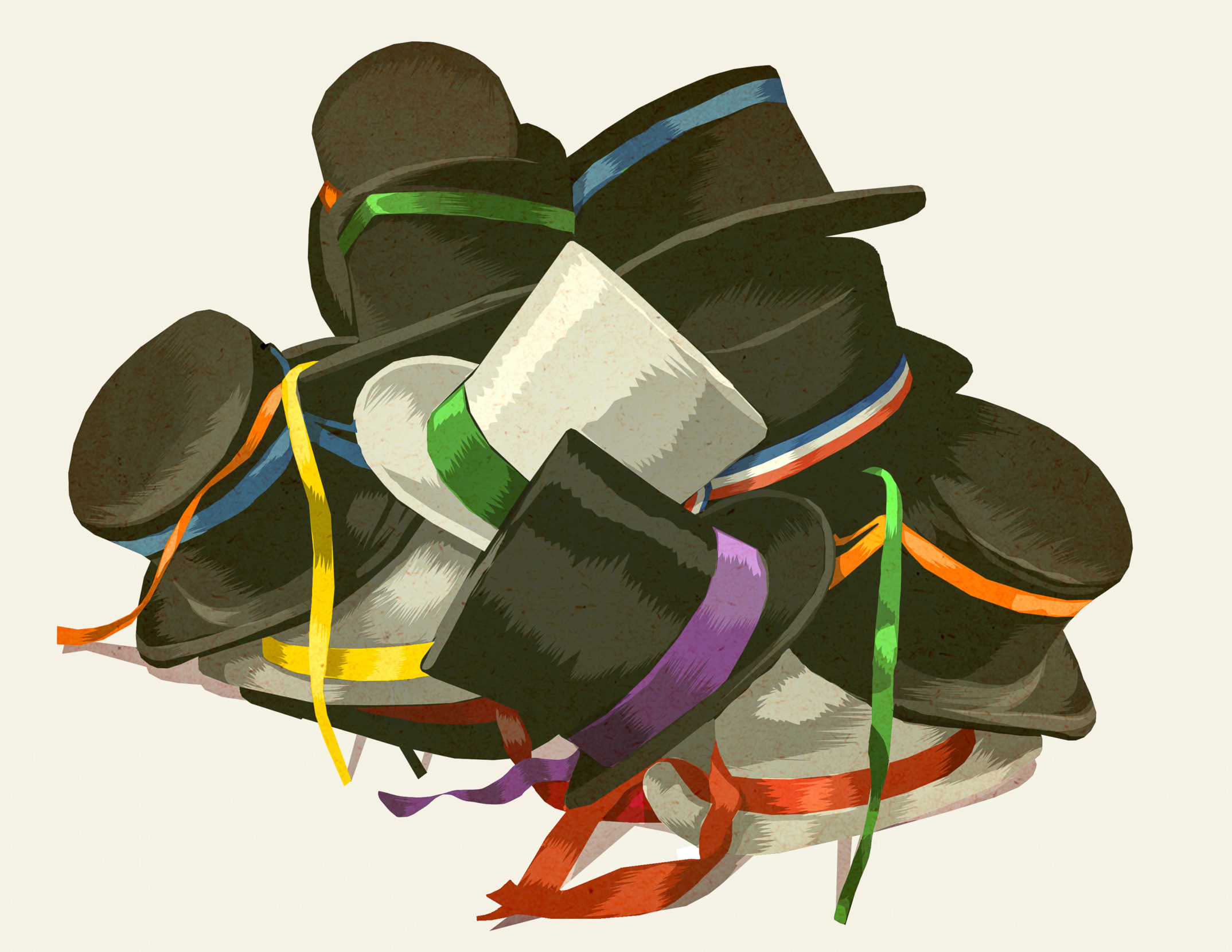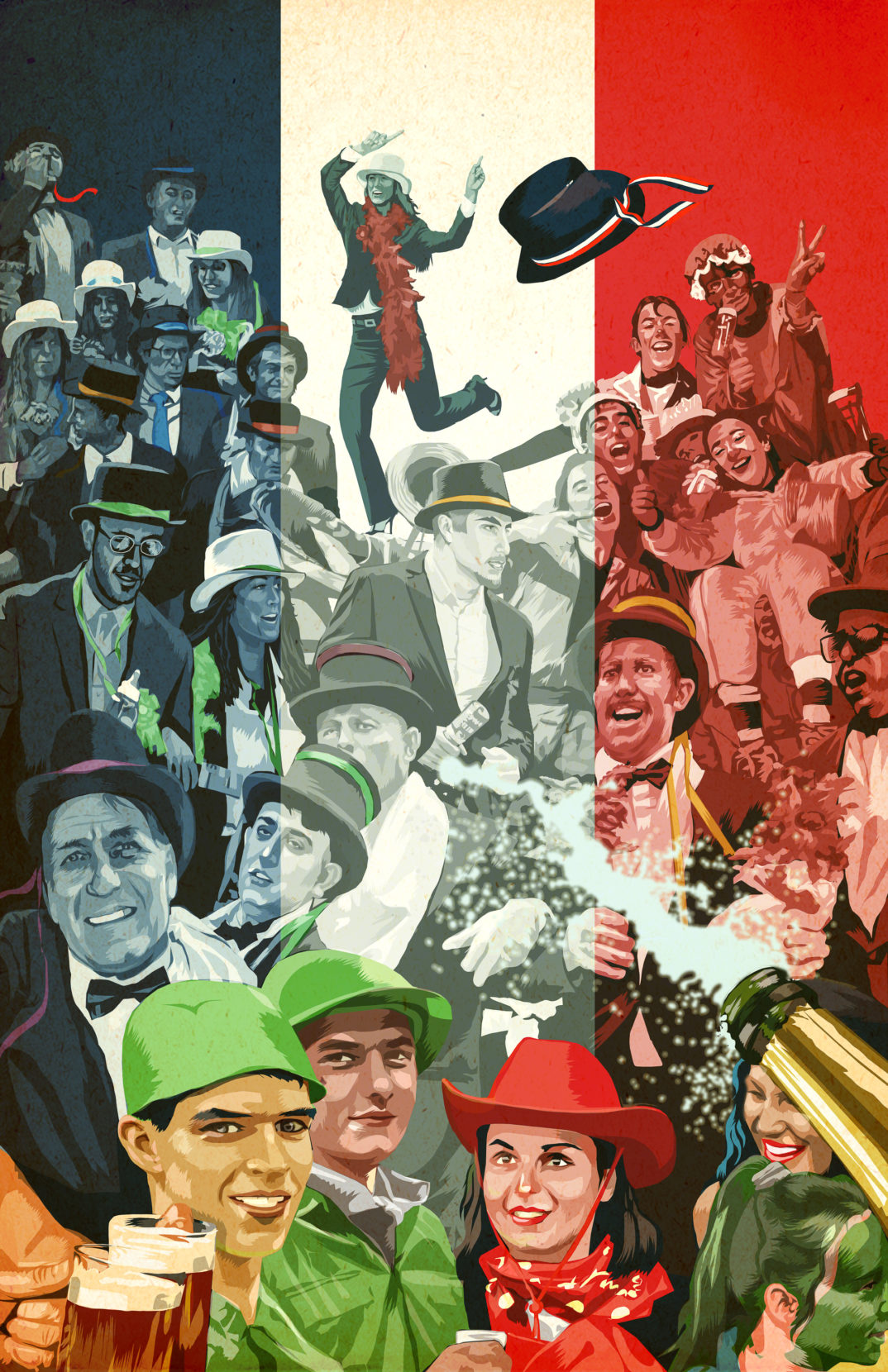Support Hidden Compass
We stand for journalism, science, history, and hope. Make a contribution to Hidden Compass and stand with us.
On a damp March evening in eastern France, carnival floats buckle under the weight of gyrating, dancing, bouncing bodies. Jeeps, Land Rovers, and battered old Peugeots honk their horns.
The elderly, who have done this so many times before, shout and dance with the young. Dozens of youthful faces are speckled with adolescent acne, eyes bright and cheeks flushed from alcohol and exertion. Many of these revelers are wearing a curious combination of baby onesies, giant inflatable pacifiers, and black top hats.
The town of Dracé, usually home to fewer than a thousand people, is bloated in size tonight. I’ve made the journey from my home in Lyon, more than 30 miles south, with a group of friends in their late 20s and early 30s. We’re here to celebrate les conscrits — annual village parties that began as a type of “last hurrah” for young men in the winemaking region of Beaujolais who’d been conscripted for military service.
My friends grew up in this area and seem to know everyone. Our progress is slow as they hug and kiss old friends and acquaintances, share cigarettes, and toast one another with plastic tankards of cheap lager.
A stone column — commemorating the young residents of Dracé who never made it back from the front during World War I — rises eerily from the mist in front of a little church. Every town in France has a memorial like this, yet the list of engraved names here seems impossibly long for such a small village.
The explosions start — crack! crack! crack! — like gunfire. Clouds of gray smoke drift by. One of the young men in a onesie squats over the exploding firecrackers, laughing. The air is thick with noise and joyful confusion. It smells like gunpowder, sweat, and wet dog.
~~

The ribbon on a black top hat, or gibus, denotes a conscrits celebrant’s age. Twenty-year-olds wear green ribbons, 30-year-olds wear yellow, 40-year-olds orange, 50-year-olds blue, 60-year-olds purple, and 70-year-olds burgundy. Those aged 80 sport the tricoleur — the red, white, and blue of the French flag. Illustration by Matthew Laznicka.
Two months later, in late May, the cherry trees in Dracé are sagging under the weight of ripe fruit the color of wine. The village is empty now, glowing in the sunshine. The air is clear and smells faintly of grass. In my imagination, I can still see the wafts of smoking gunpowder.
I’m here to see Alain Courtaud, an energetic 65-year-old who celebrated his first conscrits in 1967, nearly a century after the tradition began. Courtaud, a large man with big hands and a wide smile, bounces from room to room to fetch photos, conscrits costumes, coffee, and cherries.
The first conscrits party occurred in 1880, after Charles Hugand, from the town of Villefranche-sur-Saône — just about 13 miles from Dracé — wanted to commemorate the 20-year anniversary of his having been called up for military service. He decided to throw a huge bash, and so the tradition of les conscrits was born. It has endured in Beaujolais (and other rural pockets of France) ever since.
It’s reveling in life, in debauchery.
Les conscrits have expanded since Hugand’s day, and are no longer reserved for 20-year-old men. Mandatory military service in France was suspended several decades ago, and today anyone celebrating a decennial birthday is considered a conscrit; the ribbon on their black top hats, or gibus, denotes their age.
Courtaud’s home in Dracé is modest — a bungalow dwarfed by a sprawling, sun-drenched garden. We descend a narrow staircase that looks as though it should lead to a wartime bunker. But down below is a wine cellar, nearly the size of the house. Rows upon rows of dusty bottles line the walls, cabinets are crowded with wineglasses, and top hats adorned with different colored ribbons from celebrations throughout the years are everywhere.
These days 20-year-olds — the original conscrits — wear green ribbons on their gibus. Thirty-year-olds wear yellow, 40-year-olds orange, 50-year-olds blue, 60-year-olds purple, and anyone turning 70 gets a burgundy chapeau. Those aged 80 proudly display the tricoleur — the red, white, and blue of the French flag.
To add to the chronological confusion, anyone who marked a decennial birthday the previous year — the 21-year-olds, 31-year-olds, and so forth — is considered a guest of honor. Their role in the revelry is to “bury” their conscrits. To do that, they’re supposed to don death-themed attire rather than wear decorated top hats. That means the festivities are populated with monks and priests, ghosts and jolly Grim Reapers.
(This morbid undertone may reflect the reality that many of the 20-year-old men who left for war never returned home. That was the case during World War I, writes Jean-Jacques Pignard, former mayor of Villefranche-sur-Saône, in his 1988 book Les Conscrits de Villefranche-en-Beaujolais. For the duration of the war, there were no conscrits celebrations. But in 1919, the year of their 30th birthdays, members of the “class” of 1909 reunited to celebrate the conscrits. Eighteen men — a quarter of the original conscrits — never returned from the front. The parade and celebrations were followed by Sunday Mass and a visit to the cemetery to commemorate the dead.)
A stone column — commemorating the young residents of Dracé who never made it back from the front during World War I — rises eerily from the mist in front of a little church.
Some of the hats in Courtaud’s basement belonged to his father, some were his son’s, and some his wife’s. A few villages invited women to attend the conscrits starting in the 1970s, but many were slow to allow it. In Villefranche-sur-Saône, where the largest conscrits are held, parts of the celebrations are still male-only.
Courtaud pulls magnum bottles of wine from the shelves. Like the gibus, they’re decorated with colored ribbons. A bottle painted with the name “André” and a purple ribbon marks his father’s 60th. Alongside it is a bottle with “Alain,” his own name, adorned with an orange ribbon for his 40th, and the yellow-ribboned hat worn by his son in this year’s celebrations.
“I love seeing my son celebrate his conscrits the way I did, and my father did before me,” says Courtaud. “It’s a big part of our history, and I hope that my great-grandchildren will do the same.”
His slobbering dog, a graying black Labrador mix named Chivas, deposits a soggy tennis ball at my feet as Courtaud animatedly shares his stories about a lifetime of conscrits.
The parade that I’d attended that damp Saturday night was just a small part of a much larger celebration. The following day, the conscrits concluded with Sunday Mass at Dracé’s little church, followed by a ceremony at the village’s war memorial to honor local fallen soldiers. The final event was a banquet — a feast filled with laughter, dancing, and, in true Beaujolais fashion, free-flowing wine.
“It’s the intermingling of generations, which is fantastic,” Courtaud says. “A 90-year-old from the village paraded on a Harley-Davidson in 2017, and when he was 80 he did the whole thing on roller skates. You can celebrate the conscrits at any age, but the older generation doesn’t tend to party for a full eight days.”

Les conscrits began in 1880 as a “last hurrah” for young men heading off to war. The tradition has endured ever since, despite the fact that mandatory military service in France was suspended decades ago. Illustration by Matthew Laznicka.
~~
Robert Bernard and his wife, Marie Nicole, live in a little apartment in the town of Thoissey, just across the Saône river from Dracé. When I arrive, I’m greeted with wide smiles, gesticulating hands, and plenty of wine. It’s not even lunchtime yet.
My friend Jocelyn Bernard invited me here to meet his grandparents. He just turned 30. Robert is approaching his 90th birthday. Both men were conscrits this year, but only one has seen military conflict.
Those celebrating their first conscrits this year, and even the 30-year-olds I’m with, are too young to remember global conflict on European soil.
The Bernard family is so deeply rooted in Beaujolais that wine runs through their veins. Robert, now retired, worked in agriculture as a younger man. Joce is a wine connoisseur and collector who organizes tastings. The two men are small, with heavy brows and thick carpets of facial hair. Everyone in their clan looks alike, they say. In a Beaujolais village you can spot a Bernard a mile off.
On every inch of wall, on every mantlepiece and shelf, are photographs. The dates on them help distinguish the Bernard men from one another. There are photos of Robert with his “class” of conscrits, seven other men from his village — smiling, smartly dressed, and in a neat row, as though posing for a school photo. They look young enough to have been at school.
There are also photos of a younger Joce proudly wearing a gibus with a green ribbon at his first conscrits, his face rounder and smoother than it is now. Babies, groups of siblings, the past century of Bernards in Beaujolais — they’re all proudly on display.
“We partied for eight days straight,” says Robert, remembering his first conscrits — in 1952, seven years after the Second World War ended — while topping off everyone’s wine and taking a large handful of candied peanuts. Back then, so as not to interfere with the wine harvest, village conscrits took place each year between October and February. Now they’re usually between January and June.
Robert, who’d left school at the age of 14 to work on a farm, says parties had been infrequent during his childhood in occupied France. “We didn’t hop from village to village celebrating a different conscrits each week, as they do now,” he says, side-eying his grandson. (Joce is renowned for his unfailing party enthusiasm.) “We didn’t have cars. I remember the first car arriving in the village — it was the year of my first conscrits.”
Physically, Robert doesn’t occupy much space anymore. His arms and legs are shrunken, and his body seems to have channeled energy into feeding his toothbrush mustache and beetling brows. But his personality dominates the room. He holds court at the dining-room table as though his apartment were a château, and regales us with funny stories. A captive audience, we reel with shock when he wants us to, laugh when it pleases him.
Joce is like a younger version of his grandfather, and not just physically. Energetic, happy-go-lucky, laissez-faire, he chimes in with joking remarks and translates rural slang that I don’t understand.
Back when they were young, “[Robert] was such an idiot,” says Marie Nicole, with crinkled eyes and a teasing half smile. “I thought he’d never find someone to marry him.”
Her neat hair is more pepper than salt now, her skin freckled from a life lived in the countryside.
Just a few months after his first conscrits, Robert was deployed for service.
“I was sent to Germany,” he says. “It was routine — there was no war at the time. A couple of months later, though, I was sent to Morocco, this time for active service.”
Morocco was a French protectorate at the time, and in the summer of 1953, French authorities forced Moroccan Sultan Muhammad V into exile. That act invigorated a growing anticolonial, national-liberation movement.
Robert and his regiment boarded a train from Trier (then Trèves), Germany, to Marseille, France, where a boat was waiting to take them across the Mediterranean Sea to Algeria. The train stopped in Lyon, and the soldiers had time to stretch their legs and have a coffee.
Today, Robert’s regiment would have been less than an hour’s drive from his family. But going to visit them was out of the question. There was no time. He wouldn’t see Marie Nicole, by then his girlfriend, or his family for 15 months.
In my imagination, I can still see the wafts of smoking gunpowder.
~~
And now, after almost a quarter of a century of peace, war has broken out in Europe once again. Those celebrating their first conscrits this year, and even the 30-year-olds I’m with, are too young to remember global conflict on European soil. In the month following Russia’s February invasion of Ukraine, some 30,000 Ukrainians fled to France — a number that has been steadily growing since. Yet that situation barely seems real among the vineyards and pierres dorées (golden stones) of these Beaujolais villages.
Robert talks briefly about his active service, then swats aside the memories of Morocco like flies. Scorching temperatures, swat. Scorpions in boots, swat. Month after month living in a tent, swat.
“La guerre n’est jamais propre,” he says. War is never clean. It’s easier to remember the good times.
He’s not keen to talk about the current situation in Ukraine either. “A dictator” is all that he’ll say about Vladimir Putin.
Then he reaches for another photo album. His eyes light up as he asks me to identify him among 30-odd men in a black-and-white photo, and I do so instantly.
~~
On the way back to Lyon, I cast my mind back to the conscrits celebrations in Dracé: Joce tearing apart a straw hat with his teeth; 70-year-olds in top hats dancing with 31-year-olds dressed as monks; 20-year-olds clutching baby bottles.
The festivities are populated with monks and priests, ghosts and jolly Grim Reapers.
A swarm of flies is stuck to the windscreen. The sun’s heat is fierce already, and I drive with the car windows down. I pass Thoissey’s war memorial, topped with a stone rooster. The soldiers’ names are streaked with bird mess, and it would be easy to think that these memorial pillars stand all but forgotten. But the conscrits prove otherwise.
I can now see how conscrits are “a snub to winter and to prowling death,” as Jean-Jacques Pignard writes in Les Conscrits de Villefranche-en-Beaujolais. “It’s reveling in life, in debauchery. It’s a whirlwind.”
Yet even without the outfits, this year’s conscrits looked young to me — younger than Robert looked in the photos just before he left his village. I think of U.S. President Herbert Hoover famously saying, “Older men declare war. But it is the youth that must fight and die.”
Amid the jokes and anecdotal tales before Robert bid us goodbye, embracing each of us and ruffling Joce’s hair, there was a moment when he stared into the distance for a long, silent moment, disappeared into memory.
La guerre n’est jamais propre.
Anna Richards
Anna Richards has been scribbling since she could hold a crayon. In 2021 she turned her hobby into a full-time job and relocated from the UK to Lyon, France. She was drawn by a love of the mountains, and the French language and culture (not to mention the wine and cheese).
Never miss a story
Subscribe for new issue alerts.
By submitting this form, you consent to receive updates from Hidden Compass regarding new issues and other ongoing promotions such as workshop opportunities. Please refer to our Privacy Policy for more information.



